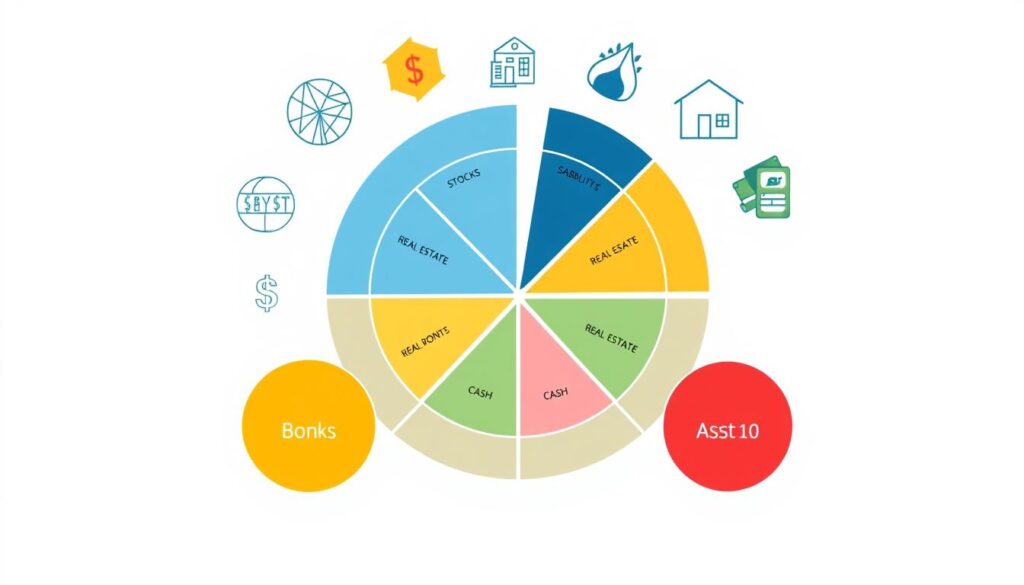
In today’s fast world, many Nigerians aim for financial freedom. This guide gives you key tips to manage your money and achieve financial independence. You’ll learn how to budget, diversify income, and grow your wealth over time.
Whether you’re new to managing money or want to improve, this article has you covered. We’ll teach you about budgeting, saving, paying off debt, and investing. Our goal is to help you reach your financial goals.
Key Takeaways
- Craft a robust budget to gain control over your finances
- Prioritize saving and building an emergency fund for financial resilience
- Develop strategies to eliminate high-interest debt and improve your credit score
- Diversify your income streams to increase your earning potential
- Invest wisely for long-term growth and financial security
Craft a Robust Budget
Making a detailed personal budget is key to good financial planning. By tracking your spending and focusing on what’s really important, you can manage your money better. This helps you make smart choices about your financial future.
Track Expenses Meticulously
The first step is to track your expenses carefully. Break down your spending into must-haves like housing, utilities, and food. Also, note your fun spending, like going out or dining.
This helps you see where your money goes. You can then spot ways to save.
Prioritize Essential Spending
- After you know your spending, focus on essential spending. Make sure you cover basic needs first.
- Set aside money for things like rent, electricity, and groceries. This ensures you meet your critical expenses.
- By focusing on essential spending, you lay a solid base for financial planning. This way, your most critical needs are met.
Being proactive with personal budgeting and expense tracking helps you control your finances. You can then make smart choices about your essential spending and overall financial planning.
Boost Your Savings Diligently
Creating a solid personal savings plan is key to financial freedom. With the right savings strategies, you can reach your financial goals. This sets the stage for building wealth over time.
First, set a realistic savings goal that fits your life and needs. It could be for an emergency fund, a home down payment, or retirement savings. Having a clear goal keeps you on track and motivated.
Look for ways to increase your savings, like automating transfers or using high-yield accounts. These methods help you save regularly without the urge to spend more.
- Automate transfers to your savings account to make saving effortless.
- Utilize high-yield savings accounts to maximize the growth of your personal savings.
- Review your budget regularly and identify opportunities to increase your savings strategies.
- Celebrate small wins along the way to stay motivated in your wealth building journey.
“The key to building wealth is to pay yourself first.” – Warren Buffett
By using smart savings strategies and aligning spending with goals, you can grow your personal savings. This takes charge of your financial future.
Eliminate High-Interest Debt
High-interest debt is a major hurdle to financial freedom. Credit cards and personal loans with high interest rates can drain your money. This money could be used to grow your wealth instead. Creating a solid debt repayment plan is key to taking back control of your finances.
Develop a Debt Repayment Strategy
First, list all your debts, including interest rates and minimum payments. Focus on debts with the highest interest rates first. These are the most expensive and should be your top priority. You might also consider consolidating debts into one loan with a lower interest rate. This can make payments easier and save you money on interest over time.
- Identify high-interest debts, such as credit cards and personal loans, and focus on paying them off first.
- Explore debt consolidation options to combine multiple debts into a single, lower-interest loan.
- Allocate a larger portion of your monthly budget towards debt repayment to accelerate the process.
- Negotiate with creditors for reduced interest rates or better repayment terms, if possible.
- Avoid taking on new debt while actively working to pay off existing obligations.
Creating a solid debt repayment plan and sticking to it can help you tackle high-interest debt. This will free up resources for more important financial goals. It’s a step towards achieving financial freedom.
| Debt Type | Interest Rate | Minimum Payment | Outstanding Balance |
|---|---|---|---|
| Credit Card A | 18.99% | $75 | $3,500 |
| Personal Loan B | 12.75% | $150 | $8,000 |
| Credit Card C | 22.49% | $100 | $4,200 |
Diversify Your Income Streams
Having only one income source can leave you open to financial surprises. To ensure long-term financial stability, it’s key to look into different ways to earn money. This might mean starting a side business, investing in real estate, or freelancing. Diversifying your income helps protect you from job loss or economic downturns.
Explore Passive Income Opportunities
Passive income is money that comes in with little effort. It’s a solid way to strengthen your finances. Some top passive income ideas include:
- Rental income from real estate investments
- Dividends from stocks and mutual funds
- Affiliate marketing and online content creation
- Licensing intellectual property or creative work
- Investing in peer-to-peer lending platforms
These passive income sources can bring in steady cash. This helps you build wealth and financial security over time. By looking into different passive income options, you can lessen your dependence on one income and take charge of your financial future.
| Income Diversification Strategies | Potential Benefits |
|---|---|
| Side Hustles | Earn extra income, develop new skills, and explore entrepreneurial opportunities |
| Rental Income | Generate passive income from real estate investments |
| Freelance Work | Leverage your expertise to earn additional income on a flexible schedule |
| Dividend-Paying Investments | Earn regular payments from stocks, bonds, or mutual funds |
By diversifying your income and exploring passive income, you can create a strong financial base. This boosts your overall financial security.
Personal Finance Tips
Managing personal finance can seem tough, but with the right steps, you can reach financial freedom. Here, we’ll share key tips to help you manage your money well.
Creating a solid budget is a must. It helps you track your spending and focus on what’s important. Saving regularly is also key. It helps you prepare for surprises and work towards your goals.
Getting rid of high-interest debt and making a plan to pay it off is vital. Also, finding different ways to make money can help you grow financially. This adds stability and growth to your finances.
| Personal Finance Tip | Description |
|---|---|
| Budgeting | Develop a detailed budget to track your expenses and prioritize essential spending. |
| Savings | Commit to regular savings contributions to build a financial cushion. |
| Debt Repayment | Develop a strategy to eliminate high-interest debt and improve your financial standing. |
| Income Diversification | Explore passive income opportunities to supplement your primary income. |
By following these tips and learning more about finance, you can control your financial future. This will lead to more freedom and security.
“Wealth is not about having a lot of money; it’s about having a lot of options.” – Chris Rock
Remember, personal finance is a journey. Stay disciplined, protect your money, and spend wisely. This will help you build a strong financial future.
Invest for Long-Term Growth
Investing for the long term is key to building wealth and financial freedom. By creating a diverse investment portfolio, you can balance risk and aim for high returns. This strategy helps you grow your money over time.
Understand Asset Allocation
Asset allocation is at the core of long-term investing. It means spreading your investments across different types, like stocks, bonds, and real estate. This way, you can lower your risk and aim for steady growth.
When thinking about asset allocation, consider a few things:
- Your risk tolerance: Think about how much market ups and downs you can handle.
- Your investment timeline: Know your long-term financial goals and how long you plan to invest.
- Your investment strategies: Look into different approaches, like buy-and-hold or active trading, to match your goals.
Understanding asset allocation helps you create a strong, diverse portfolio. This portfolio can handle market ups and downs and grow steadily over time. It’s a big step towards building your wealth.

Remember, long-term investing isn’t about quick wins or market guesses. It’s about a steady, disciplined approach to wealth building and reaching your financial goals over time.
Protect Your Finances
Keeping your finances safe is key to long-term financial security. Getting the right insurance is a big part of this. It helps protect your money and assets from risks.
Secure Appropriate Insurance Coverage
Insurance is vital for financial protection. It acts as a safety net against unexpected events. These events could harm your financial plans. Here are some important types of insurance:
- Life insurance: It helps protect your loved ones financially if you pass away too soon. It ensures their financial security.
- Health insurance: It keeps you and your family safe from high medical costs. It protects your finances from unexpected illnesses or accidents.
- Property insurance: It guards your valuable things, like your home and belongings. It protects them from damage, theft, or natural disasters.
- Disability insurance: It replaces some of your income if you can’t work because of a disability. It helps keep your financial stability.
It’s important to check your insurance often and update it as needed. This makes sure you have the right risk management tools. They help protect your financial future.
“Protecting your finances is not just about saving money, but about securing your financial future against unexpected challenges.”
Develop Financial Discipline
Achieving financial freedom needs strong financial discipline. It’s key to have good money management habits. This means checking your budget often, not buying things on impulse, and waiting for what you want.
These financial habits help you make better choices. Delayed gratification is especially useful. It means choosing long-term goals over quick wants. This helps you save, invest, and manage money better.
- Review your budget regularly to ensure you’re staying on track.
- Avoid impulse purchases by taking a step back and considering the long-term impact on your finances.
- Practice delayed gratification by prioritizing your financial goals over immediate wants.
Getting financially disciplined is a big step towards freedom. By adopting these habits, you can better control your money. This leads to making choices that support your long-term financial dreams.
| Habit | Benefits |
|---|---|
| Regularly reviewing your budget | Ensures you’re spending within your means and staying on track with your financial goals. |
| Avoiding impulse purchases | Helps you save money and allocate resources more effectively towards your financial priorities. |
| Practicing delayed gratification | Allows you to prioritize long-term financial stability over short-term desires, leading to greater wealth accumulation. |
“Financial discipline is the foundation upon which true wealth is built.” – Unknown
Leverage Tax-Advantaged Accounts
Building a secure financial future needs smart planning and using the right tools. Tax-advantaged accounts are a key part of your financial plan. They help with retirement planning and investment strategies.
Maximize Retirement Contributions
Putting the most you can into retirement accounts like 401(k)s and IRAs is wise. These accounts offer tax benefits and help your savings grow faster. Using these accounts well can make your retirement more comfortable.
Here are some tips to boost your retirement savings:
- Put in the maximum allowed to your 401(k) or other plans. This can get you employer matching, adding to your savings.
- If you can, open a Roth IRA. It grows tax-free and lets you withdraw without taxes in retirement.
- Open a traditional IRA if you can’t get into an employer plan. It grows tax-deferred for retirement.
Using these tax-advantaged accounts can grow your wealth. This helps with financial optimization for a secure future.
| Account Type | Key Features | Contribution Limits (2023) |
|---|---|---|
| 401(k) | Tax-deferred growth, employer contributions | $22,500 ($30,000 for those 50 and older) |
| Traditional IRA | Tax-deferred growth, potential tax deductions | $6,500 ($7,500 for those 50 and older) |
| Roth IRA | Tax-free growth and withdrawals in retirement | $6,500 ($7,500 for those 50 and older) |
Maximizing your contributions to these tax-advantaged accounts is key. It helps with retirement planning and investment strategies. This way, you can optimize your financial optimization and secure a prosperous future.
Build an Emergency Fund
An emergency fund is key to a solid personal finance plan. It acts as a financial safety net, helping you deal with unexpected costs, job loss, or other emergencies. Building a strong emergency fund boosts your financial resilience and helps manage risk management, making your financial security stronger.
It’s wise to aim to save enough for three to six months’ essential expenses. This amount can help you face financial surprises without using up your long-term savings or getting into debt. Making the emergency fund a top financial goal means you’re ready for life’s surprises.
Creating an emergency fund needs discipline and regular effort. Start with small amounts and add to them regularly. Automating your savings makes it simpler and faster to reach your goal. As your finances grow, increase the amount you save for your emergency fund.
Having a well-stocked emergency fund does more than just protect your money. It also brings peace of mind and confidence in making smart choices when things get tough. By developing this important habit, you’re moving closer to lasting financial security.
“A well-funded emergency fund is not just about protecting your financial stability; it also provides peace of mind and the confidence to make informed decisions during challenging times.”
Continuously Educate Yourself
Keeping up with the latest financial trends and best practices is key for long-term financial education and personal finance success. Make a commitment to lifelong learning. This means regularly reading financial content and getting advice from experts.
Stay Updated on Financial Trends
It’s vital to stay informed to make smart choices that match your financial goals. Read top financial publications, go to workshops and seminars, and talk to financial pros. This commitment to lifelong learning helps you confidently move through the changing financial world.
- Subscribe to trusted financial blogs and newsletters
- Attend local workshops and seminars on personal finance topics
- Reach out to financial advisors for personalized guidance
- Explore online courses and educational resources
By always learning, you’ll be ready to adapt, seize new chances, and make wise financial choices. These steps will help you reach your goal of financial freedom.
Seek Professional Guidance
Personal finance is a skill we all need. But sometimes, getting professional financial advice is really helpful. A financial advisor or planner can give you advice that fits your unique situation and goals.
These experts can guide you through tough financial decisions. They can also help you improve your investment strategies. This way, you can work towards financial security and freedom.
Getting advice from a professional financial planning expert might cost time and money. But it can really pay off in the long run. They can give you a new view, find chances you might miss, and create a detailed plan for your financial dreams.
“A good financial advisor can be the difference between financial freedom and financial struggle.”
Your financial health is too important to gamble with. So, value the help of professional financial guidance. Start working on your financial future today.

Align Spending with Values
Seeking personal financial freedom means aligning spending with your values and goals. This ensures your spending matches your vision for a secure, fulfilling future.
Prioritize Financial Goals
First, set clear financial goals. This could be saving for a home, retirement, or a cause you care about. Then, spend your money in ways that help you reach these goals.
- Establish specific, measurable, and time-bound financial goals.
- Allocate your resources to align with your top financial priorities.
- Regularly review and adjust your spending to stay on track with your goals.
Using a value-based approach to finance brings purpose and fulfillment. It also secures your financial future. This way, you make choices that meet your needs now and support your future goals.
“The key to financial freedom and great wealth is a person’s ability to convert earned income into assets, while keeping expenses low.”
– Thomas J. Stanley
Conclusion
This guide offers a detailed plan for financial freedom in Nigeria. It suggests budgeting, saving, paying off high-interest debt, and finding more ways to earn money. These steps help you manage your finances and build wealth.
Learning more about money, getting advice from experts, and spending wisely are also crucial. Start this journey to gain financial freedom, money management, and wealth building for your financial security.
The advice in this article covers budgeting and using tax-advantaged accounts. It’s a complete approach to personal finance for reaching your financial goals in Nigeria. Follow these tips to begin your path to financial empowerment and independence.





